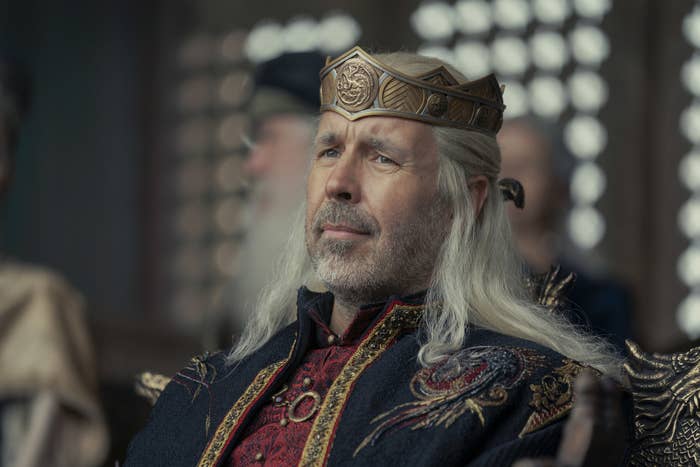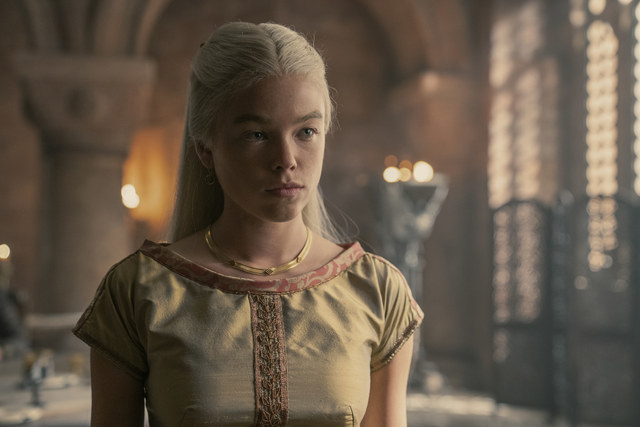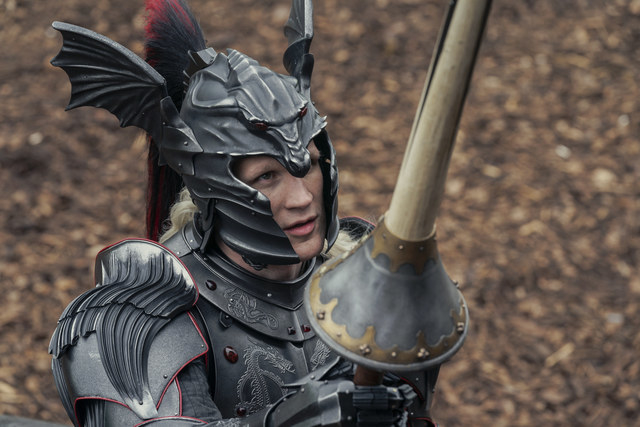
If there was a sense of justice or morality underpinning the world, House of the Dragon would be a train wreck. The existence of the Game of Thrones prequel series is, like the impending Amazon Lord of the Rings series, a foreboding statement about the dominance of intellectual property in today’s media landscape. The show’s existence is wringing blood from a Dragonstone, and by all rights, it should be a failure.
But, as Game of Thrones author George R.R. Martin’s work is fond of reminding us, the world is a cruel place ungoverned by logic or ethics: House of the Dragon, which premieres on Sunday on HBO, is excellent, and a better series than any Thrones spinoff should have the right to be.
In large part, that’s because House of the Dragon is first and foremost a TV show, rather than an adaptation of novels. Sure, it’s based on some of Martin’s original work — specifically the 2018 novel Fire and Blood, along with a couple of short stories. But Martin wrote the source material as distant history being told by scholars, rather than active, narrative accounts of what happened, leaving plenty of room for interpretation. Freed from the burden of re-creating a specific text, House of the Dragon is able to use the visual language and effects acumen established by the original series to make something that feels at home on television, with episodes that are contained and structured.
Where Game of Thrones told a sprawling, epic story following various threads, wars, and family squabbles across multiple continents, House of the Dragon spends most of its time in King's Landing with the Targaryen family, the titular House of the Dragon, about 200 years before the events of the original series. This decision is enormously beneficial to House of the Dragon, which is able to establish all of the relevant players in and around the family, then quickly launch into tracking their machinations.
Here’s the short version: King Viserys I (Paddy Considine) is some years into his reign over Westeros, but lacks a male heir. Sensing a power vacuum, most of the people around him start competing to become or install the next ruler, including Viserys’s Hand of the King Otto Hightower (Rhys Ifans), his rival and leader of a daunting naval fleet Corlys Velaryon (Steve Toussaint), his volatile brother Daemon (Matt Smith), and the actual heir to the throne, Princess Rhaenyra Targaryen (Milly Alcock, then Emma D’Arcy). Unable to accept a queen of Westeros, the rest of the competitors butt heads in an endless series of meetings, tense family dinners, and lavish parties.
If that description sounds familiar, it should. Ryan Condal, one of House of the Dragon’s showrunners along with frequent Thrones director Miguel Sapochnik, explicitly compared the series to Succession. Admittedly, House of the Dragon isn’t comical like Succession (though it is occasionally funny), since there are so many people being literally, rather than verbally, mauled to death on a semiregular basis. But in its focus on palace intrigue and the ever-changing whims of a patriarch, the series effectively conjures the specter of the ultra-powerful, ultra-petty Roy family, but in reverse: Instead of an inscrutable bull rampaging through a family of weaklings, the man on the throne is an incompetent dope surrounded by sharks.
Viserys Targaryen, First of His Name, might be the king, but he is stunningly naive. For example, he is repulsed by the suggestion that someone marry a child for political reasons, an extremely common practice in the kingdom he rules. He tries to avoid thinking about war if at all possible, ignoring the long-simmering violence that’s practically a given in Westeros. Strangest of all, he’s genuinely interested in his family members’ happiness. (In many respects, Viserys feels like a mostly harmless dad who got Jumanji-ed into the highest echelons of power.) He consistently tries to do the right thing, which in Westeros makes him an easily manipulable target for anyone with designs on the throne — which, in King’s Landing, is everyone.
As the unwitting target of everyone’s machinations, Viserys is the center of gravity for House of the Dragon, and Considine’s performance anchors the show. His hangdog look, the uncomfortable, shuffling way he carries himself (thanks to the slow effects of a mysterious illness), the combination of sadness and irritation he can never quite shake as a man who is fundamentally in the wrong place and time — all combine to make him instantly memorable.

But Viserys is basically keeping the throne warm, outshone by the child he didn’t really want. Early on, Viserys names his intense, capable daughter Rhaenyra his heir, making her the first woman set to ascend the Iron Throne. As you might expect, the men of Westeros do not take this news well. In the six episodes provided to critics, Rhaenyra contends with the people who want to alternately push her out of the way or marry her as a power grab, including representatives from the Hightower, Velaryon, and Lannister families. But her ultimate antagonists are, of course, other Targaryens.
In particular, Rhaenyra develops a contentious, complicated relationship with Daemon. Smith is squarely in his element as a swaggering scoundrel who swerves between extreme competence, sleazy charisma, and complete abjection. Throughout the first few episodes, he’s a force of chaos, evoking equal parts the wounded pride of Jaime Lannister and the gleeful sadism of Ramsay Bolton. As Daemon becomes simultaneously reprehensible and magnetic — both to us, and to Rhaenyra herself — Smith seems to be the cast member having the most fun, imbuing even Daemon’s lowest moments with a sense of childish impunity. No matter what he does, no one besides Viserys can really touch him, because he’s a Targaryen.
This focus on Rhaenyra and the ways that various other Houses try to undermine her claim to the throne proclaims House of the Dragon’s big theme in neon: the ways in which women are boxed into the role of producing babies, their lack of real power, and what they’ll do to claim it. These questions were a major part of Game of Thrones. But here, they’re central, starting with the show’s opening sequence, which depicts a group of men, led by the aging King Jaehaerys, deciding to overlook Rhaenys, the king’s oldest living descendant, in favor of her younger cousin, Viserys.
For those worried about the idea of a Game of Thrones: Women's Edition prequel again feeding the trend of uncritically valorizing real people in positions of power as badass khaleesis, House of the Dragon does not fall into the trap of making Rhaenyra a straightforward, Jon Snow–style hero.
Instead, House of the Dragon takes pains to clarify that this era of Westeros will be just as complicated and almost as devoid of virtuousness as Game of Thrones. Innocent children rapidly mature into capable players of political games. Good-natured, reasonable men meet their demise. Rather than the birth of a hero, Rhaenyra’s story feels like the rise of a monster.
The other women of House of the Dragon are similarly murky. Rhaenys Targaryen, the woman denied the Iron Throne, could mentor her young cousin Rhaenyra, but chooses to be bitter and cynical about the prospect of a woman taking power. Alicent Hightower (Emily Carey, then Olivia Cooke), Otto’s daughter and Rhaenyra’s best friend, has shades of Sansa Stark in her journey from sweet, naive girl at court to merciless schemer. And Daemon’s paramour Mysaria, a former dancer played by Sonoya Mizuno, is the rare player who wasn’t born into nobility, which makes her the most intriguing character on the show without the last name Targaryen.

Rhaenyra herself is as petulant as she is sympathetic in her frustrations, though there’s little sense of why she wants to be queen, other than spite. (Relatable.) A woman in a man’s world, she seeks independence and freedom from the royal family, but falls back on her authority when it becomes convenient, and ultimately revels in being able to use her family name as a way to flout the conventions of polite society. Like her descendant Daenerys, Rhaenyra is becoming a queen, and she has plenty of people willing to teach her how to be a cold, cruel ruler.
As the young Rhaenyra, Milly Alcock is phenomenal, steely enough to court a viewer’s admiration, and adept at emanating a princess’s self-possession and calculation. Her Rhaenyra is also prone to flashes of rage, which occasionally reads as teen flightiness, and is capricious enough to remind us why, by the time Game of Thrones is set, the people of Westeros often say that when a Targaryen is born, the gods flip a coin.
On paper, there seems to be little urgency in dramatizing this era. If you want to, you can go to the source material or the fan Wikis and look up which side the coin lands on: what happens to Rhaenyra, who eventually takes the throne, how her relationships with the other characters change. We already know that House Targaryen is on the road to collapse.
But the dramatic irony in knowing House of the Dragon has to get from point A to its inevitable point B — a Targaryen civil war known as the Dance of Dragons — is one of the show’s strongest assets. The series flies through time, jumping ahead a few months here, a year or two there, largely (though not entirely) discarding the uninteresting bits to furnish a set of interlocking stories. When the series transitions from Rhaenyra’s youth to her adulthood (and Emma D’Arcy takes over the role), it breezes past several years in which little of note seems to have happened.
It’s a refreshingly efficient approach. House of the Dragon wants to get to the good parts, and stay there. There are moments when the show feels like it’s losing steam, only to skip ahead and introduce an altered political landscape, growing families, and new feuds. Throughout all of this, Viserys reigns supreme, and King’s Landing remains shockingly stable. House of the Dragon is the Westerosi end of history: Everyone simply assumes things will go on as they are, forever, with the same set of Houses and a Targaryen on the throne.
While there are a couple of awkward attempts to explicitly set up the events of Game of Thrones, for the most part, House of the Dragon is more interested in its characters as characters, rather than how they connect to a TV show we watched 10 years ago. How the players respond to the status quo, and the schemes they use to try to hijack it, say interesting and compelling things about them — they aren’t pieces in a puzzle that needs to eventually fit together to show Arya stabbing the Night King.
The performances and characters are highlights, but there are plenty of other reasons to watch House of the Dragon. Sapochnik and the series’ other directors Greg Yaitanes and Clare Kilner make good use of being mostly confined to King’s Landing to inject flash and style into the proceedings — the show’s budget is only a bit higher than the final season of Game of Thrones’, but the production team has more than enough experience creating Westeros to do it confidently. A few locations have been reimagined (including the infamous Dragonpit, which lies in ruins by the time of Game of Thrones), and the production design manages to evoke memories of the original series while conjuring a whiff of staleness as the Targaryen empire crests past its prime. There are even a few full-on battles that range from sieging caves to storming beaches and flyby dragon attacks. Oh, yeah — there are a lot of dragons.
All this spectacle is a lot of fun, but it’s far less interesting than what Thrones excelled at all along: petty, powerful people sniping at each other. And House of the Dragon aces those scenes, so much so that I feel comfortable paying it a substantial compliment: You could probably enjoy this prequel without having watched the original series.
It’s possible that, as time goes on, House of the Dragon will tip its hand and start gesturing more obviously toward Game of Thrones. But for now, it has more punch, more depth, and more self-awareness than you might expect from a series spun off to capitalize on the success of Thrones, and deserves to win over its skeptics. I’m still weary of the drive to mine successes for more and more content. But oddly enough, House of the Dragon proves that big TV franchises don’t have to fit into something bigger. They can just be good stories. ●
